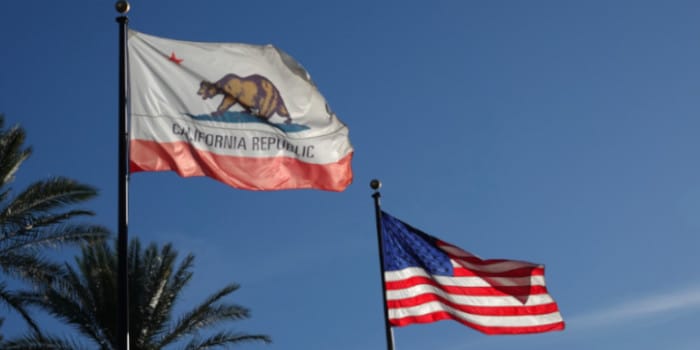- Casino
- By State
- Alabama
- Alaska
- Arizona
- Arkansas
- California
- Colorado
- Connecticut
- Delaware
- Georgia
- Florida
- Hawaii
- Idaho
- Illinois
- Indiana
- Iowa
- Kansas
- Kentucky
- Louisiana
- Maine
- Massachusetts
- Maryland
- Michigan
- Minnesota
- Mississippi
- Missouri
- Montana
- Nebraska
- Nevada
- New Hampshire
- New Jersey
- New Mexico
- New York
- North Carolina
- North Dakota
- Ohio
- Oklahoma
- Oregon
- Pennsylvania
- Rhode Island
- South Carolina
- South Dakota
- Tennessee
- Texas
- Utah
- Vermont
- Virginia
- Washington
- West Virginia
- Wisconsin
- Wyoming
- By State
- Slots
- Poker
- Sports
- Esports
Supreme Court Ruling Removes Hurdles for Tribal Casinos Development

The California Supreme Court issued a ruling in favor of a tribal case dating back to 2002, allowing the tribe to build new Class III casinos and removing a barrier for the construction of new facilities. Split in a 5-2 opinion, the court stated that the Governor has the power to allow the Department of the Interior to take land into trust for gaming.
United Auburn Challenged the Compact
The ruling was issued in a lawsuit filed by the United Auburn Indian Community, arguing the Governor exceeded his authority by entering into tribal compact for a land that had not been yet taken into trust by the Department of the Interior. The tribe challenged the compact as it allowed another tribe, the Enterprise Rancheria of Maidu Indians, to build a casino 20 miles away from the location of United Auburn’s Thunder Valley Casino Resort.
The Enterprise Rancheria of Maidu Indians planned to construct a casino featuring Class III games such as roulette, slots and blackjack and requested the Interior Secretary in 2002 to acquire land in Yuba County, north of Sacramento, on the tribe’s behalf.
The Interior Secretary notified the state governor in 2011 that an approval from the Governor office is required to take land into federal trust under the federal Indian Gaming Regulatory Act (IGRA).
Then-California Governor Jerry Brown concurred with the decision and executed a gaming compact with the tribe months before the land was purchased by the Department of the Interior and placed into federal trust.
Supreme Court Ruling
The California Supreme Court had to deal with the case after another appellate court agreed with the assessment from United Auburn, basing its decision on a Proposition 1A which amended the state constitution to give the Governor the authority to negotiate compacts and allow casinos on tribal lands.
The Supreme Court rejected United Auburn’s interpretation that the Governor may not approve a decision to take land into trust for Class III gaming as it is in violation of the general ban on casino-style games in the state constitution, with Proposition 1A setting an exception to the ban regarding tribal lands.
The court ruled that such an interpretation would create a definition of tribal lands not consistent with state or federal law or precedent. To prohibit casino gaming on lands taken into trust under IGRA would base the legality of casino gaming on whether the tribal land was acquired after IGRA was enacted.
The court did not agree with Governor Newson’s argument that the Governor is granted implicit power to concur, as in accordance with federal law and under IGRA he is given that power while no language in the legislation prohibits it.
The court also rejected the interpretation that the failure to expressly mention the power to concur in Proposition 1A would imply any sort of limitation regarding the Governor’s inherent powers.
Regarding United Auburn’s other argument, that the Governor entered into a tribal gaming compact before the land was actually placed into trust, the Supreme Court outlined that 57 other compacts in the state had been negotiated that way, with United Auburn’s own one among them.
The Supreme Court ruling would not only allow the Enterprise Rancheria of Maidu to build their Class III casino, but would also help another tribe, the North Fork Rancheria of Mono Indians, as it eliminated a major hurdle in the tribe’s prolonged quest to develop a casino near Madera.
Related Topics:
With 5+ years of experience as an analyst, Julie—affectionately known as 'Jewels' in the office—has quickly become our go-to expert in the forex and cryptocurrency space. Her keen attention to detail and deep understanding of the industry make her an invaluable asset. Julie's expertise and enthusiasm have made her the top choice to co-pilot educational initiatives alongside Mike, bringing knowledge to the masses.
Previous Article

Legal
September 5, 2020
Supreme Court Rules in Favor of Wynn Resorts Former Employee

Must Read
Legal
July 7, 2025
Former SkyCity Executives Sued Over AUSTRAC Penalty













